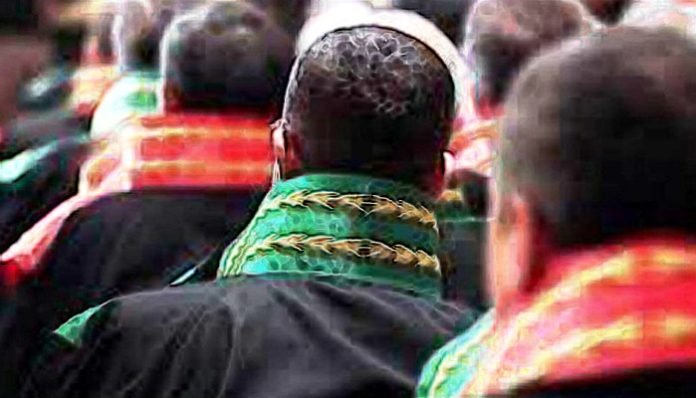The Turkish judiciary is facing an unprecedented crisis following the Supreme Court of Appeals’ refusal to comply with the Constitutional Court’s (AYM) ruling in the case of a jailed lawmaker as well as filing criminal complaints against AYM members, triggering a wave of backlash, protests and accusations of a judicial coup, Turkish Minute‘s Bünyamin Tekin reported.
Can Atalay, an opposition lawmaker from the Workers Party of Turkey (TİP), filed a petition with the AYM in July claiming that he has been subjected to several rights violations due to his continued incarceration despite acquiring parliamentary immunity after winning a seat in the legislature in May.
The Supreme Court of Appeals decision came after the AYM ruled that Atalay’s right to be elected and to engage in political activity as well as his right to personal liberty and security had been violated.
The 3rd Criminal Chamber of the Supreme Court of Appeals decided not to comply with the AYM ruling in an unprecedented move and filed criminal complaints against AYM members who voted in favor of the decision.
Former Turkish President Abdullah Gül criticized the the Supreme Court of Appeals’ decision to target AYM members, calling it inexplicable and wrong. Gül emphasized the importance of respecting the constitutional order and warned that the current judicial chaos could damage Turkey’s international reputation.
Özgür Özel, the newly elected leader of the main opposition Republican People’s Party (CHP), has been vocal in condemning the Supreme Court of Appeals decision, labeling it a blatant coup attempt against the constitutional order. He called on the public and other political groups to resist and oppose this move.
Özel had requested an extraordinary meeting of the parliament’s advisory council from Parliament Speaker Numan Kurtulmuş. However, this request was denied as a result of this development; CHP lawmakers have decided to start a vigil in parliament to protest the Supreme Court of Appeals decision. The deputies have organized themselves into groups of 20 to stay overnight in the parliament, with the vigil set to continue, including over the weekend.
Ahmet Davutoğlu, former prime minister and the leader of the opposition Future Party (GP), described the decision as an assault on the legal order and a threat to the constitutional system.
Temel Karamollaoğlu, leader of the opposition Felicity Party (SP), echoed these sentiments, calling the decision unacceptable and a serious threat to the rule of law.
İstanbul Bar Association chairperson Filiz Saraç filed a criminal complaint against the members of the the high court’s Third Criminal Chamber, accusing them of violating the Constitution.
In İzmir, lawyers and members of the İzmir Bar Association organized a protest against the decision.
Led by Zöhre Dalkıran, deputy chair of the İzmir Bar Association, the protesters chanted slogans and emphasized the need to defend the law against what they termed a “judicial coup.”
The European Parliament’s Turkey rapporteur, Nacho Sanchez Amor, also weighed in on the crisis on X, formerly Twitter, saying the Supreme Court of Appeals decision not complying with the AYM ruling is “surreal.”
Amor said the decision creates an unprecedented institutional crisis and confirms all concerns about Turkey’s judiciary expressed by the EU and the Council of Europe over the years.
“The inability of Supreme Court of Appeals to ensure the legal foreseeability and security of Turkish citizens is a longstanding issue,” lawyer Ali Yıldız from the Brussels-based Arrested Lawyers Initiative told Turkish Minute.
“Turkish courts do not abide by the rulings of their respective higher courts, and the spreading anarchy within the judiciary has proved this argument right,” Yıldız said.
“Anyone whose appeal has been reviewed by the Third Criminal Chamber of the Supreme Court of Appeals can justifiably claim that their right to an independent and impartial court, which should be bound by the law, has been violated.”
Calling on Turkish opposition parties to “deny the Erdoğan courts even an iota of legitimacy,” Yıldız said the current crisis should lead them to promise groundbreaking reforms in the judiciary with the help of the Venice Commission, “which should include a re-examination of all judges and prosecutors and a lustration [the process of purging government officials who were involved in abuses or corruption] procedure for biased judges in line with the Council of Europe guidelines.”
“I hope this will be a wakeup call for the opposition,” Yıldız said.
According to senior legal correspondent Alican Uludağ, the crisis between the high courts happened as part of an internal struggle within the Justice and Development Party (AKP) government.
The far-right Nationalist Movement Party (MHP) and AKP members close to the MHP appear to be strategically positioning themselves against certain members of the AKP, Uludağ claims.
Senior AKP figures such as Hayati Yazıcı, Hüseyin Çelik and Faruk Çelik criticized the Supreme Court of Appeals’ decision, in contrast to the support from some advisors of President Recep Tayyip Erdoğan.
This internal conflict within the AKP is exacerbated by the alleged influence of judges and prosecutors close to MHP in the judiciary, according to Uludağ.















